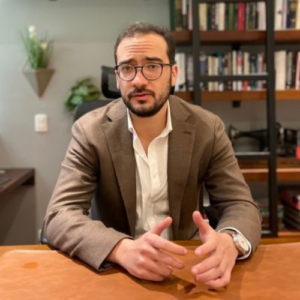The news became an immediate trend on Colombia's social networks: Cambio magazine would once again be part of the country's media ecosystem, no longer as a print product, but as a digital media outlet.
The expectation made sense. For years, Cambio (meaning “change”) was one of the most important media outlets in the country, at one point it was owned by Nobel Laureate Gabriel García Márquez and had been founded by one of the fathers of Colombian investigative journalism, Daniel Samper Pizano.

Cambio's logo (Twitter)
In 2011, it was abruptly closed in the middle of a scandal that involved a journalistic investigation into the delivery of agricultural subsidies to established businessmen that allegedly upset the government of then-President Álvaro Uribe Vélez.
Its closure generated a debate on press freedom in Colombia and the degree of influence of the powerful on editorial decisions of the media. So its return, especially in the midst of what appears to be an information gap left by the change of owners of Semana magazine – the leading critical media outlet – was big news.
“There are expectations basically because Colombia has always had at least one significant media outlet of reference that is a bit critical. And at this moment what we have are very government-aligned media, like RCN Radio, Television or like Semana; media not very close but aligned with [President Iván] Duque or government-aligned like El Tiempo or Caracol Radio; some critics like El Espectador, but not enough, so the arrival of a new media outlet is celebrated,” Ómar Rincón, a Colombian media analyst and critic, told LatAm Journalism Review (LJR). "It is a celebration of optimism, and more because there has always been a critical media outlet that was Semana, in its good times, and that now has become aligned with Duque and former President Álvaro Uribe, so I think it emerges as a light of opportunity."
The fact that Semana magazine has remained the only one of its kind in the country is for María Paula Martínez, media analyst and critic, and university professor, what gives more importance to the resurgence of Cambio.
"For a media scene as scarce as the Colombian one, it is very important that new initiatives arise that end such exclusive monopolies," Martínez, who is also one of the directors of a podcast dedicated to the analysis of Colombian journalism, told LJR. "Cambio is proposed as a new alternative for weekly political analysis that comes at a very important moment: right in time for the legislative and presidential electoral period."
Another aspect that generates expectations according to Rincón has to do with the fact that the president (publisher) of Cambio is Daniel Coronell, “who is the most critical journalist in Colombia. The journalist who has denounced the worst barbarities of Uribismo and Duque, so he generates a perspective that is quite interesting," Rincón said.
Coronell himself is perhaps the most recognized journalist in the country. Until a few months ago he was the president of Noticias Univisión, founded and directed different media in Colombia and in 2020 was singled out as the most read columnist in the country, in addition to having received different awards and recognitions. Just after his controversial dismissal from Semana, he founded, together with another columnist who left Semana, Daniel Samper Ospina, and investigative journalist Daniel Samper Pizano, the site Los Danieles. The space for different "homeless" columnists has become very popular in the country.

Daniel Coronell (Twitter)
A little over a year ago when the new owners of Cambio – who bought the rights to use this name – told him about the project and the intention to revive the magazine, Coronell saw that it was important to offer a new media outlet to the Colombian audience
“For some time, in my view, a void has been felt in terms of investigation, analysis and opinion. It does not mean that other media are not doing it, they are. There are very outstanding and very noteworthy efforts in that regard, but there is not one that groups them together and does it consistently. So, we think that there is a certain journalistic possibility and that we can get to work on that," Coronell told LJR.
The journalist also highlights all the possibilities offered by technology at the present time.
"It is a great challenge to put all these new tools at the service of an informative, analytical and opinion-based purpose that is a bit, let's say, orphaned in Colombia," Coronell said.
And that is why his team, which is still kept secret, will be made up of "outstanding veterans of the trade with young recent graduates." For Coronell, his most recent experience at Univision allowed him to see the virtues of joining these two worlds.
“We are experiencing a very special moment for media where many veterans first have a certain dose of contempt and a lot of fear in the face of what the digital world does. They tend to trivialize and think 'why, if I wrote in-depth articles, do I now have to go to Instagram to tell my story?' And on the other hand, there is a whole young generation that tends to think that the world was invented last week, that it was not possible that someone could tell about it without Twitch or TikTok. And it turns out that the two have a fundamental role. And learning from each other and achieving a combination of those visions is what can help us move journalism forward,” Coronell said. “I believe that the investigative capacity and narrative strength of veteran journalists is fully in force. But you have to adapt. We cannot remain in the comfort of our past successes."
Media and economic power in Colombia
The announcement of Cambio’s arrival also sparked a discussion about media, owners and press freedom. For Martínez, for example, the arrival of Cambio is relevant due to the "legitimacy crisis suffered by various traditional media."
Rincón considers that one of Colombia's problems is media concentration.
“Colombia is poorly classified in the freedom of expression indices for many reasons: violence, self-censorship, judicial persecution, government and police harassment. But one of the things that marks Colombia as the worst scenario is the media concentration. In other words, there are very few media and very few sources of information,” Rincón said. “The arrival of Cambio in that sense is healthy. Any media outlet that comes to reinforce the media ecosystem is great because it will have some different perspective and may help to have other types of perspectives to be able to inhabit it.”
Media in Colombia, according to Rincón, have married the different powers: economic, political and even the aristocracy. “Their focus is on political scandals. They are far from the citizens' agendas,” he said.
It’s a situation that the owners of Cambio are also aware of, said Federico Gómez Lara, who will be the editorial director of Cambio and is the son of one of the owners, Patricia Lara. For Gómez, the great expectation generated by the arrival of Cambio has to do precisely with the possibility of being a different option.
"In Colombia, we fell into that spiral, which is not unique to us, but it did hit us in a very particular way and that is because the very wealthy remained as the owners of the information," Gómez told LJR. “In other parts of the world that happens, but they are so focused on their business, on reaching Mars, on reaching the Moon and so on, that the issue of the media is left a little aside. Here we have some bankers acting as media directors and that has become very serious, because what people see in the media are the interests of big capital, both political and economic. So that has had very serious effects for democratic stability in the country.”
Martínez also highlights the impact that media owners in Colombia are having on the vision of the country and the world that they are presenting, as well as the influence they are having through these.
“What happened with Semana has shown once again that media ownership does influence editorial agendas. It is naive to think that strong and powerful economic groups buy a media outlet for profitability that isn’t there: the media business, from bad to worse, advertising falling, subscribers, too,” Martínez said. "They do it because a platform to impact public debate does have high value."

Federico Gómez Lara (Twitter)
Faced with the question of how to guarantee precisely that independence with the capitalist partners of Cambio, Gómez assures that the mere presence of Coronell is a great guarantee.
“Because Daniel is a man who has already shown on several occasions that his journalistic ethics is above the conditions of hierarchy of space and time of any boss. That he has already proven in the field several times and I think that is a great guarantee," he said, recalling the causes of Coronell’s dismissal from Semana.
He added that it is also because those who have invested in Cambio are not bankers, but have "managed to accumulate capital" and have now invested in this media outlet. According to Gómez, they have always been concerned about national issues. In fact, Patricia Lara had already owned Cambio when it was a print magazine.
The other two owners of the new Cambio are Gabriel Silva, a prominent businessman in the country who was Minister of Defense and Ambassador of Colombia in Washington D.C., and Maurice Armitage, a businessman and former mayor of the city of Cali.
Gómez said that from the first meeting, the issue of journalistic and business separation has been made clear.
"Sure, we have talked about it from day one, but we have to talk about it every day because it is a red line that tends to be forgotten and that from time to time you have to commit the rude task of remembering it, obviously with all courtesy. But that is part of the obligations of upholding ethics of a journalistic project today,” Coronell added.
“Because the media in the world, as a whole, are suffering great challenges regarding their financial and business models. The subsistence of the media does not come easy. And to that extent many charitable souls have arisen who are willing to help us,” Coronell continued. “But that help cannot be at the expense of people's information, because as I had the opportunity to say in the penultimate column I wrote for Semana and that, let us say, caused my dismissal: the shareholders are the owners of the beautiful building, of the equipment, of the wonderful facilities they have, but not of the information. Information is a public good and is made to serve the people, to make better decisions, not to serve to reinforce the political and economic interests of a shareholder.”
It’s a vision in which Rincón agrees. For him, the only way for the media to regain the trust of the audience is as simple as "doing journalism." This requires, according to him, to stop being aligned with the government, to improve their way of narrating and telling stories, but above all, to change media priorities for ones that really interest the citizen.
“In Colombia, a social outbreak has just happened and there it was stated that the environment, public education, public health, feminisms, sexual diversities, ancestral cultures are issues that move society and that these issues can serve to talk about politics, economics, justice and everything. That they are a new political and journalistic agenda that must be dealt with. And I think that in the Colombian case, the media think they are one-day issues,” Rincón said.
Cambio magazine will be live in January 2022, but its directors have already felt the weight of its arrival and of bearing the name.
“Now we have a great responsibility to meet that expectation. Because the emergence of Cambio occurs in an almost unrepeatable context and where a number of things converge, one of them being, as Daniel [Coronell] has called it, an ethical bankruptcy in the large media,” Gómez said. “I think that the tycoons got out of hand and I think that people have already realized it and are tired and see in us a hope of resuming that life of journalism without an agenda, a journalism well done. I think that today we have a huge responsibility on our shoulders to be up to the task.”
For Coronell, the response he expects from the audience once it is on the air is simple: "This is Cambio."